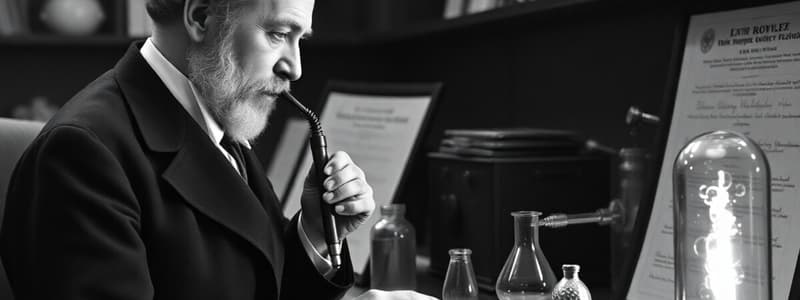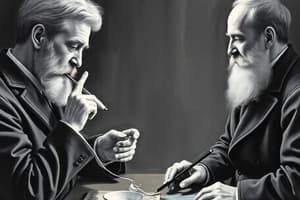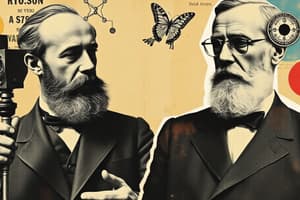Podcast
Questions and Answers
What was the main theory proposed by the scientist at the University of Stockholm regarding past ice ages?
What was the main theory proposed by the scientist at the University of Stockholm regarding past ice ages?
- Fewer volcanic eruptions contributed to ice ages. (correct)
- Ice ages were caused by increased solar activity.
- Human activities were irrelevant to climate changes.
- The Earth's orbit had no impact on climatic changes.
Which gas was specifically mentioned as being released from volcanic eruptions that could affect the Earth's temperature?
Which gas was specifically mentioned as being released from volcanic eruptions that could affect the Earth's temperature?
- Nitrous oxide
- Ozone
- Carbon dioxide (correct)
- Methane
What effect does burning fossil fuels have on the Earth's climate according to the content?
What effect does burning fossil fuels have on the Earth's climate according to the content?
- It reduces the overall greenhouse gas emissions.
- It has no substantial environmental impact.
- It significantly decreases global temperatures.
- It increases greenhouse gases in the atmosphere. (correct)
How did the scientist's theory contribute to modern climate change concerns?
How did the scientist's theory contribute to modern climate change concerns?
What was a key implication of the scientist's argument regarding gases and temperature?
What was a key implication of the scientist's argument regarding gases and temperature?
What major discovery is Wilhelm Conrad Röntgen best known for?
What major discovery is Wilhelm Conrad Röntgen best known for?
Which aspect of Pavlov's work illustrates a critical principle in behavioral psychology?
Which aspect of Pavlov's work illustrates a critical principle in behavioral psychology?
Kitasato Shibasaburo is recognized for which key medical innovation?
Kitasato Shibasaburo is recognized for which key medical innovation?
What significant idea did Jules Henri Poincaré contribute to the study of dynamical systems?
What significant idea did Jules Henri Poincaré contribute to the study of dynamical systems?
Which model of the atom did J.J. Thomson propose?
Which model of the atom did J.J. Thomson propose?
Svante Arrhenius made significant contributions to understanding what?
Svante Arrhenius made significant contributions to understanding what?
Which of the following scientists is known for a groundbreaking association with classical conditioning?
Which of the following scientists is known for a groundbreaking association with classical conditioning?
What principle did Kitasato's discovery of antidoxins support in medical science?
What principle did Kitasato's discovery of antidoxins support in medical science?
Flashcards are hidden until you start studying
Study Notes
Wilhelm Conrad Röntgen
- German physicist who discovered X-rays in 1895
- X-rays emitted from electrically charged vacuum tubes
- X-rays could penetrate human skin but were stopped by metal and bone
- Won the first Nobel Prize in Physics in 1901 for his discovery
- Also contributed to mechanics, heat, and electricity
Ivan Pavlov
- Russian-born physiologist who abandoned a religious career to pursue science
- Studied digestive secretions of dogs
- Discovered classical conditioning, also known as Pavlovian conditioning
- Classical Conditioning: dogs could learn to associate food with the sound of a bell, and would salivate in response to the bell alone
- Won the Nobel Prize in Physiology or Medicine in 1904
Kitasato Shibasaburo
- Japanese physician and bacteriologist
- Developed serum therapy for tetanus and diphtheria
- Discovered that tetanus serum could confer immunity to animals
- This principle was later applied to diphtheria protection
Jules Henri Poincaré
- French mathematical physicist
- Investigated the stability of the solar system
- His work led to the discovery of chaos theory: small changes in initial conditions can lead to large and unpredictable outcomes in a system
- His research highlighted the complex behavior of systems that appear stable
- Also conducted research in electromagnetism
J.J. Thomson
- English physicist who studied atomic structure
- Identified "corpuscles" (later called electrons) using a cathode ray tube
- Found that electrons were negatively charged and lighter than a hydrogen atom
- Proposed the "plum pudding" model of the atom: positive charge with negatively charged electrons scattered within
- This discovery revolutionized atomic theory and electricity
- Identified isotopes, elements with various atomic forms
Svante Arrhenius
- Swedish physicist who studied at the University of Uppsala
- Contributed to the understanding of the role of ions in chemical processes
Studying That Suits You
Use AI to generate personalized quizzes and flashcards to suit your learning preferences.





